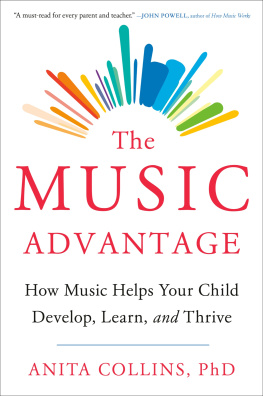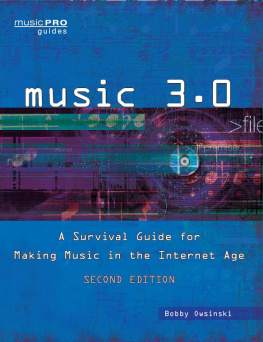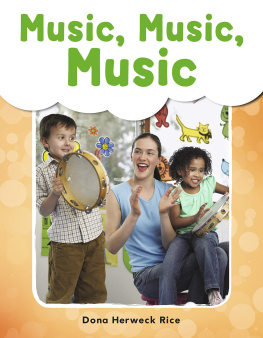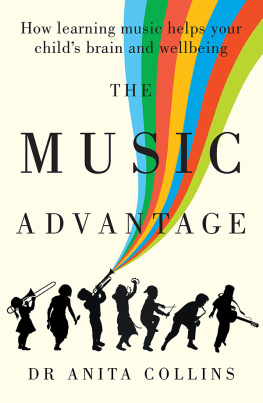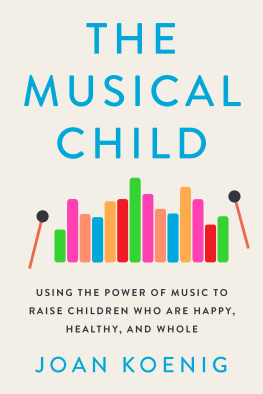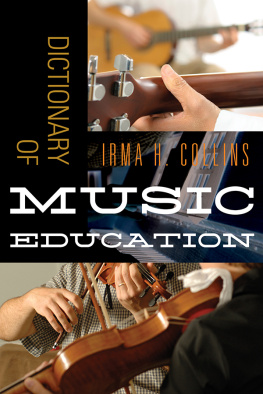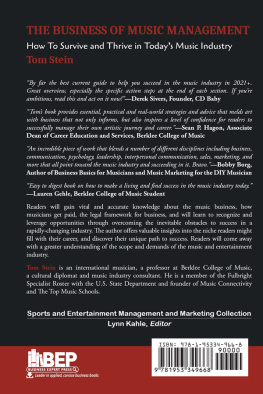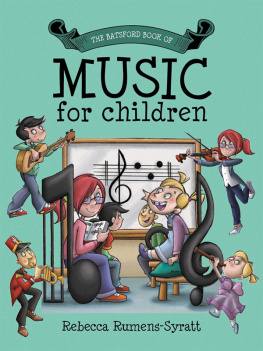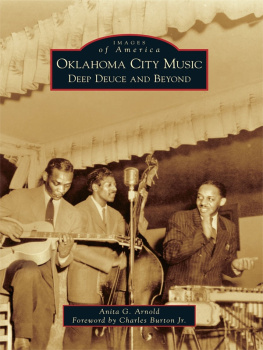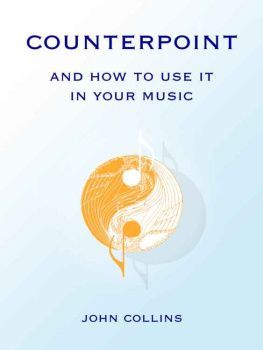Dr. Anita Collins - The Music Advantage: How Music Helps Your Child Develop, Learn, and Thrive
Here you can read online Dr. Anita Collins - The Music Advantage: How Music Helps Your Child Develop, Learn, and Thrive full text of the book (entire story) in english for free. Download pdf and epub, get meaning, cover and reviews about this ebook. year: 2021, publisher: Penguin Publishing Group, genre: Home and family. Description of the work, (preface) as well as reviews are available. Best literature library LitArk.com created for fans of good reading and offers a wide selection of genres:
Romance novel
Science fiction
Adventure
Detective
Science
History
Home and family
Prose
Art
Politics
Computer
Non-fiction
Religion
Business
Children
Humor
Choose a favorite category and find really read worthwhile books. Enjoy immersion in the world of imagination, feel the emotions of the characters or learn something new for yourself, make an fascinating discovery.
- Book:The Music Advantage: How Music Helps Your Child Develop, Learn, and Thrive
- Author:
- Publisher:Penguin Publishing Group
- Genre:
- Year:2021
- Rating:4 / 5
- Favourites:Add to favourites
- Your mark:
- 80
- 1
- 2
- 3
- 4
- 5
The Music Advantage: How Music Helps Your Child Develop, Learn, and Thrive: summary, description and annotation
We offer to read an annotation, description, summary or preface (depends on what the author of the book "The Music Advantage: How Music Helps Your Child Develop, Learn, and Thrive" wrote himself). If you haven't found the necessary information about the book — write in the comments, we will try to find it.
Dr. Anita Collins: author's other books
Who wrote The Music Advantage: How Music Helps Your Child Develop, Learn, and Thrive? Find out the surname, the name of the author of the book and a list of all author's works by series.
The Music Advantage: How Music Helps Your Child Develop, Learn, and Thrive — read online for free the complete book (whole text) full work
Below is the text of the book, divided by pages. System saving the place of the last page read, allows you to conveniently read the book "The Music Advantage: How Music Helps Your Child Develop, Learn, and Thrive" online for free, without having to search again every time where you left off. Put a bookmark, and you can go to the page where you finished reading at any time.
Font size:
Interval:
Bookmark:
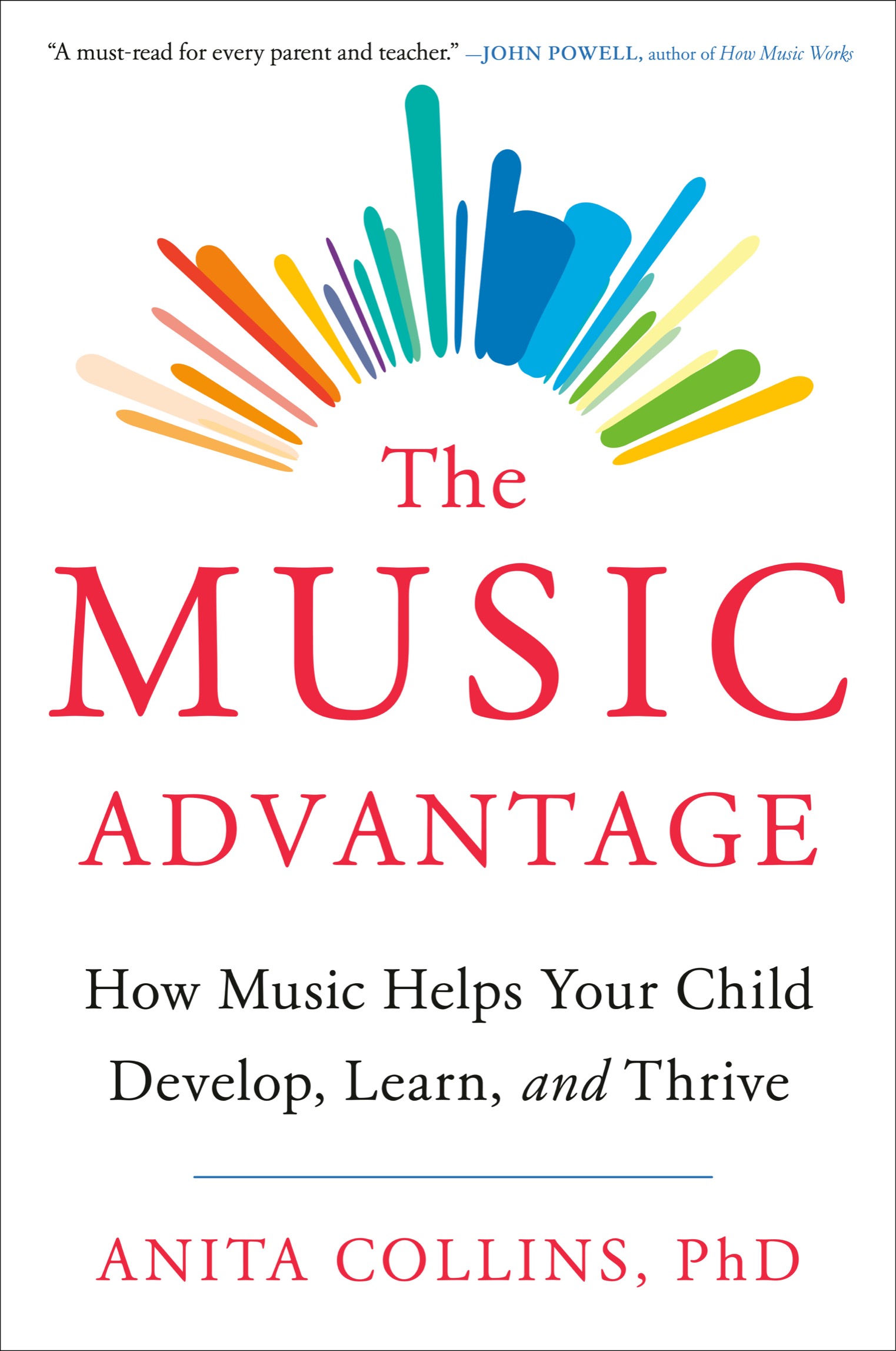
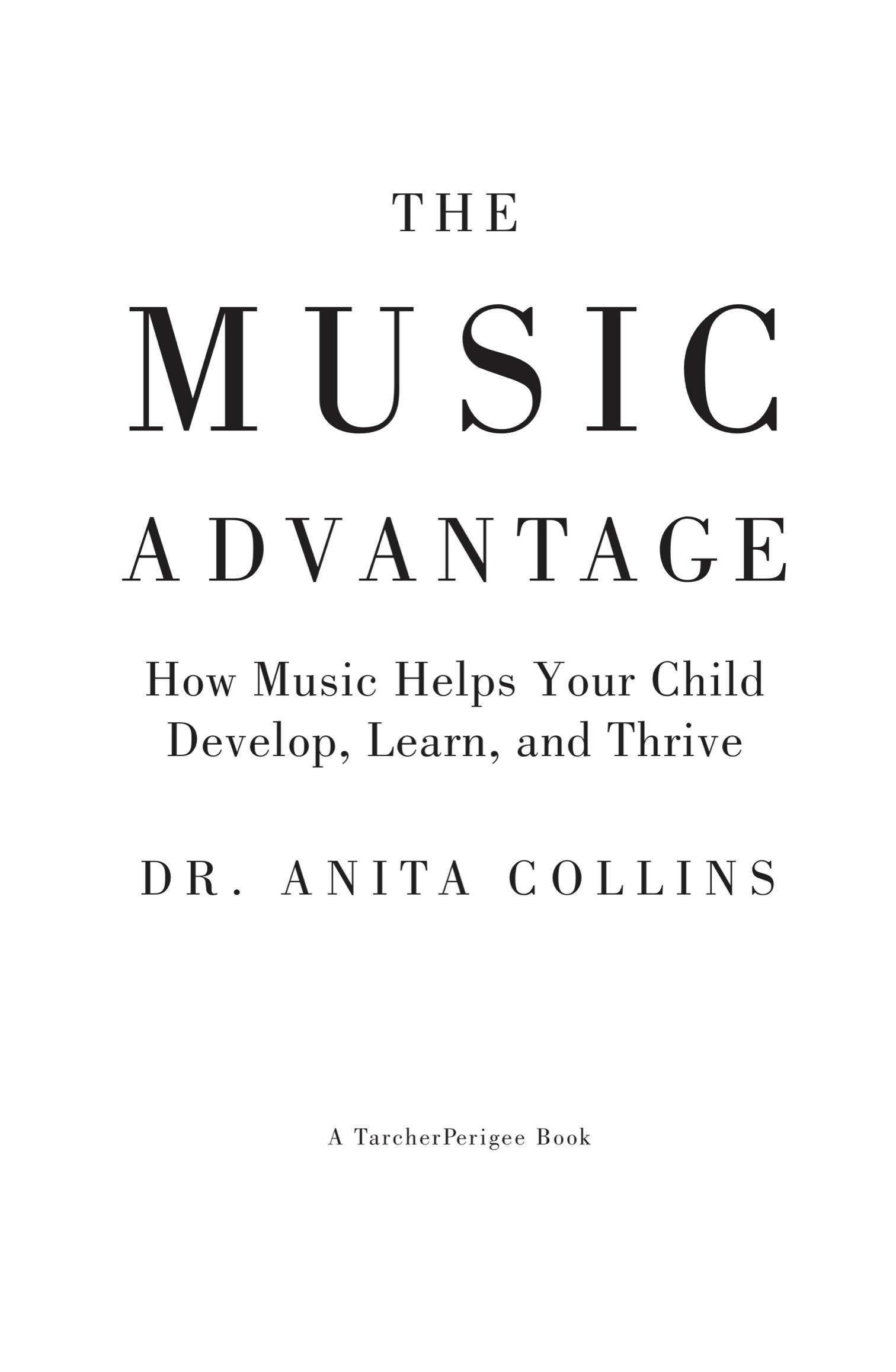
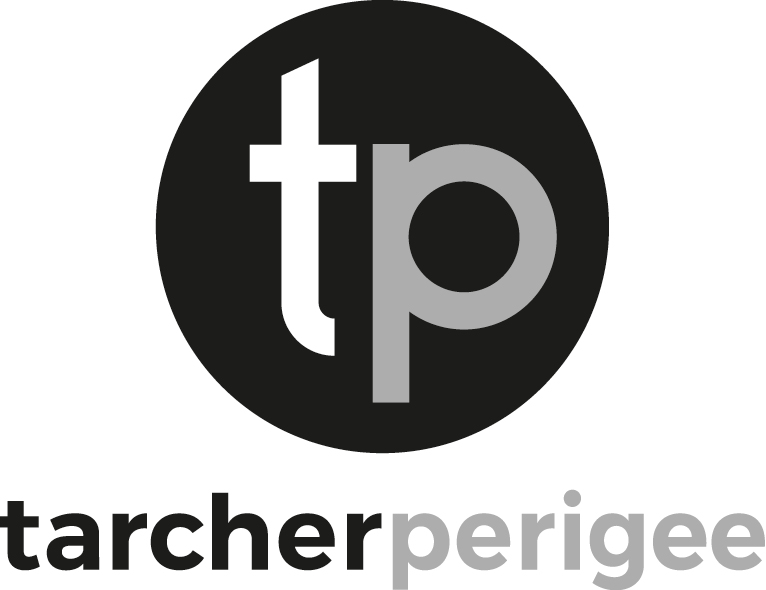
an imprint of Penguin Random House LLC
penguinrandomhouse.com
First published in Australia in 2020 by Allen & Unwin
Copyright 2021 by Dr. Anita Collins
Penguin supports copyright. Copyright fuels creativity, encourages diverse voices, promotes free speech, and creates a vibrant culture. Thank you for buying an authorized edition of this book and for complying with copyright laws by not reproducing, scanning, or distributing any part of it in any form without permission. You are supporting writers and allowing Penguin to continue to publish books for every reader.
TarcherPerigee with tp colophon is a registered trademark of Penguin Random House LLC
Library of Congress Cataloging-in-Publication Data
Names: Collins, Anita (Anita Marie), author.
Title: The music advantage: how music helps your child develop, learn, and thrive / Anita Collins.
Description: New York: TarcherPerigee; Sydney: Allen & Unwin, 2021. | Includes index.
Identifiers: LCCN 2020041086 (print) | LCCN 2020041087 (ebook) | ISBN 9780593332122 (hardcover) | ISBN 9780593332139 (ebook)
Subjects: LCSH: MusicPsychological aspects. | Child development. | MusicInstruction and studyPsychological aspects. | Musical ability in children.
Classification: LCC ML3838 .C648 2021 (print) | LCC ML3838 (ebook) | DDC 372.87dc23
LC record available at https://lccn.loc.gov/2020041086
LC ebook record available at https://lccn.loc.gov/2020041087
Jacket design: Nellys Liang
Jacket image: Shpak Anton / Shutterstock
pid_prh_5.6.1_c0_r0
For Michael and Ellie
At the end of every academic school year there is some type of celebration: a speech night, presentation assembly, or awards ceremony. Whatever it was called at your school or at your own childs school, it probably involved music. It might be a live performance by students or just recorded music selected for the event, but you can bet that at some point during the proceedings there will be music.
As a music teacher, I always marvel at the polar opposite experience of my colleagues and friends in the math, physical education, and English departments around presentation night. They appear to be gently winding down, reports finished and end-of-year decisions made. Meanwhile, music teachers like me are rapidly revving up to the most-anticipated public, and possibly judged, performance of the year. The entire school community, ready and waiting to be impressed and entertained.
Imagine a mass of musicians from the ages of ten to eighteen in an orchestra in front of the stage, and then me and my other music magic makers sitting facing them. With a running sheet many pages long and every minute of the event scheduled, we are tightly wound and ready for action. After the national anthem is played and the speeches are done, I always breathe a big sigh of relief. The show is rolling and there is a lull as the first awards are presented. If I am honest, it also gets a bit boring, so to keep the adrenaline up I play a game: How many musicians got prizes for subjects other than music this year?
For many years running the answer has been close to the same. Seventh grade is announced and ten students are awarded certificates for high achievement in science or English, while some of them receive awards for consistent achievement across all of their subjects. I would get my scorecard out, usually the back of the program, and keep a tally as they walked across the stage. Musician, musician, musician, musician, played trombone for a while but then gave up so that counts, nonmusician, musician. Do you want to guess how many on average out of ten I would get in each grade? I present this question to music educators in lectures all the time and they are usually spot-onseven or eight of the top ten prizewinners either had or were continuing a significant involvement in music.
At that point I could just congratulate myself and my music colleagues on helping to produce the best and brightest in the school, but I often asked myself a different question: Did learning music help these students to achieve at the highest levels in their academic work, or were these students already smart to begin with and therefore drawn to learning music? Was it the chicken or the egg, nature or nurture?
Little did I know that these end-of-year musings would take me, a music teacher who had very little interest in science in school and struggled with reading until I was nine years old, into the world of neuroscience and psychology. I have traveled the world looking for answers to these questions, visiting labs working in the field of neuromusical research to understand how music learning impacts on brain development. While I am a teacher of high schoolaged students, I have been amazed at how music listening and music learning at all ages, from day one of life to our final day, has the ability to grow, change, and repair our brains.
What I have found out is far more complex than just the chicken/egg or nature/nurture answer. I have learned how babies hear their mothers voice as if it was music, how the necessary neural connections for reading are active when a toddler can keep a steady beat on a drum and how music can remold the brain after injury or trauma. Turns out that the teaching of musicthe chord progressions and performance anxiety and ability to practice effectivelyisnt just content and skills. These parts, in fact, contribute to growing a human, and suddenly my role in each one of my students lives became so much more important than I ever knew.
But there was no point in just me knowing about this research. It needed to be shared, but it seemed to me that there were a few big hurdles in the way.
First, research is most commonly shared via peer-reviewed articles in academic journals. These articles are often long, hard to read, and full of jargon, and the general public would struggle to find them easily.
Second, neuroscientists and psychologists are primarily using music listening and learning to understand how the brain develops and learns, not to understand how to teach music in schools or how to transfer the findings to parents and their children. There is a gaping hole between what is published and what is happening in the world outside the lab.
Third, scientists dont say the word prove. As part of the scientific method, the findings of an experiment will only ever suggest, highlight, point to, or explore; one study will rarely if ever prove something definitively. And thats the way it should be. We need to have multiple researchers testing multiple theories in multiple ways multiple times to really understand any phenomenon. Another hurdle is that this research is based on human beings who are all unique and a product of their genetics, personality, and experiences. To identify how music and music learning may impact on brain development, researchers need to work with averages and group data, yet every child learns slightly differently and has a different mixture of predispositions and life experiences that have shaped them. For every finding that is reported, there will be an outlier whose experience goes against the norm.
Fourth, research is often incredibly detailed and difficult, and that is why researchers can spend their entire lives pursuing, in one way or another, the complex answer to a simple question. The tricky part in trying to share detailed, expert research with someone who isnt trained in the field, hasnt done research, and is trying to apply it to their own experience is the ever-present and pretty much unavoidable danger of oversimplifying.
Font size:
Interval:
Bookmark:
Similar books «The Music Advantage: How Music Helps Your Child Develop, Learn, and Thrive»
Look at similar books to The Music Advantage: How Music Helps Your Child Develop, Learn, and Thrive. We have selected literature similar in name and meaning in the hope of providing readers with more options to find new, interesting, not yet read works.
Discussion, reviews of the book The Music Advantage: How Music Helps Your Child Develop, Learn, and Thrive and just readers' own opinions. Leave your comments, write what you think about the work, its meaning or the main characters. Specify what exactly you liked and what you didn't like, and why you think so.

